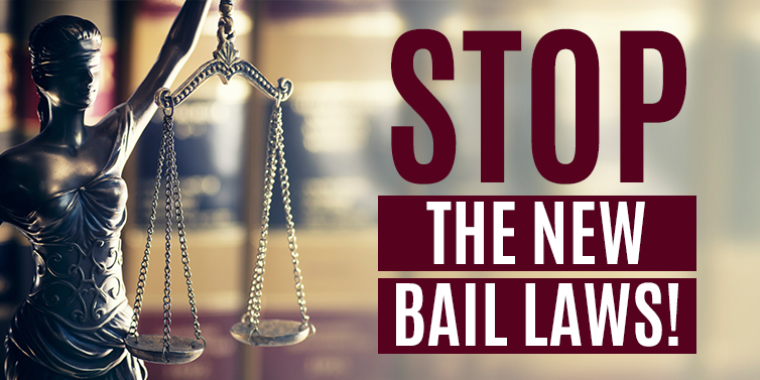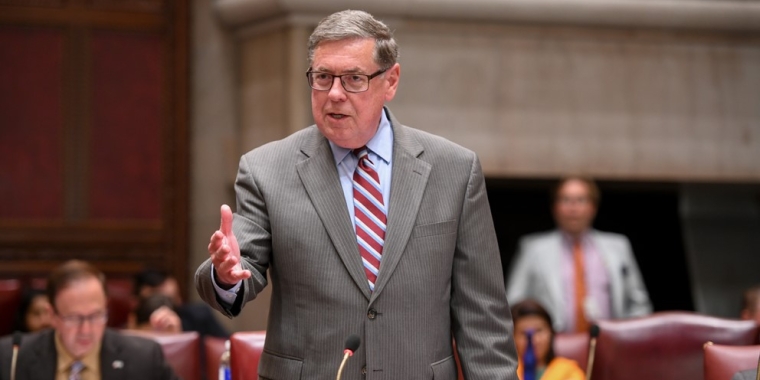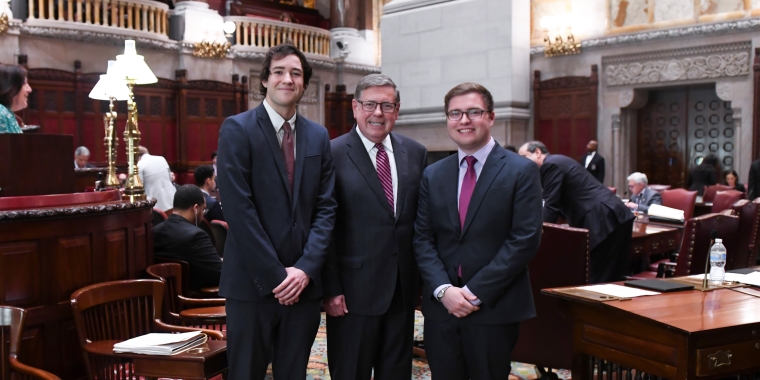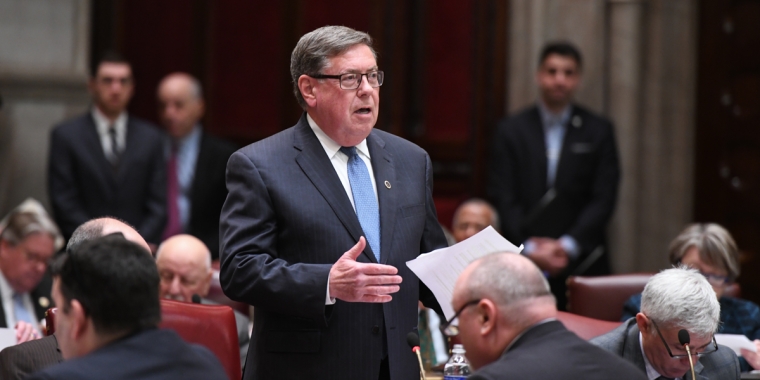
Seward Calls for Halt of New Bail Laws
Jeff Bishop, Communications Director
November 20, 2019

ONEONTA, 11/20/19 -- State Senator James L. Seward (R/C/I – Oneonta) today voiced his strong support for several measures to protect crime victims and enhance public safety. Senator Seward is co-sponsoring bills that will address concerns voiced by law enforcement, district attorneys, local elected leaders, and the general public regarding legislation scheduled to take effect at the start of 2020.
“I have always believed that protecting the public is one of the most important responsibilities of government, and when a crime has been committed the victim, not the criminal, should be our first priority,” said Senator Seward. “I am standing up for law-abiding citizens and calling for changes to several recently approved laws that will put citizens at risk.”
Senator Seward is co-sponsoring:
S.6839 – giving judges discretion to set bail in domestic violence cases;
“I voted against the so-called criminal justice reform measures because they put criminals first. While I spoke with district attorneys and law enforcement officials in my senate district before these new laws were approved, it seems others in Albany failed to reach out to the experts. If they had, they would have known about the dangerous unintended consequences associated with these laws that will put the safety of crime victims at risk, particularly domestic violence victims,” said Seward.
The “reform” measures enacted this year, eliminate cash bail and pre-trial detention for most offenses and will result in the mandatory release of 90% of perpetrators arrested, regardless of criminal history.
“Under the new laws set to take effect on January 1, 2020 perpetrators arrested for manslaughter, assault, criminal possession of a gun, and a number of drug sale offenses will all be released without bail. These suspects will be back on the streets immediately even if they have a criminal past,” added Seward.
When the new bail reform measures take effect on January 1, 2020, judges will only have the power to set bail if they determine that a defendant is a flight risk. A defendant’s criminal history, or the fact that they may pose a clear physical threat to another person, cannot be considered, creating a system in which a violent offender is likely sent back into the community, unsupervised and able to come into contact with their victim, the victim’s loved ones, and others.
“Along with the serious public safety concerns posed by the lack of bail, new discovery laws will force several unfunded mandates on our county district attorney offices and police departments. Small rural departments that are already understaffed and underfunded will be forced to hire personnel and purchase new computer systems to comply with new deadlines and requirements. In the end, taxpayers will be footing the bill to help with the defense of suspected criminals,” said Seward.
The District Attorneys Association of the State of New York it will cost $100 million for extra staff and other resources for offices outside of New York City to comply with the new discovery laws.
“Earlier this year, I joined with my Senate Republican colleagues to call for passage of a package of bills to reform the parole system to keep violent criminals behind bars and ease the parole process for suffering victims, families and the public. Those bills were not considered by the Democrat Majority. Instead, they pushed through measures that will put criminals first and endanger the public. These new bills I am co-sponsoring would right a serious wrong and tilt the scales of justice back toward law-abiding citizens,” Seward concluded.
-30-
As of January 1, 2020, a defendant must be released from custody without bail for the following crimes:
Manslaughter in the second degree
Aggravated vehicular homicide
Criminally negligent homicide
Assault in the third degree
Aggravated vehicular assault
Making a terroristic threat
Criminal possession of a gun on school grounds/criminal possession of a firearm
Criminal sale of a firearm to a minor
Arson in the third and fourth degree
Money laundering in support of terrorism in the third and fourth degree
Promoting or possessing an obscene sexual performance by a child
Aggravated cruelty to animals, overdriving, torturing and injuring animals, animal fighting
Unlawful imprisonment in the first degree
Coercion in the first degree
Grand larceny in the first degree
Criminal possession of a controlled substance in the first and second degree
Criminal sale of a controlled substance in the first and second degree, or near/on school grounds
Specified felony drug offenses involving the use of children, including the use of a child to commit a controlled substance offense and criminal sale of a controlled substance to a child
Criminal solicitation in the first degree and criminal facilitation in the first degree
Patronizing a person for prostitution in a school zone
Failure to register as a sex offender
Obstructing governmental administration in the first and second degree, or by means of a self-defense spray device
Bribery and bribe receiving in the first degree, bribe giving for public office
Promoting prison contraband in the first and second degree
Resisting arrest
Hindering prosecution
Tampering with a juror and tampering with physical evidence
Aggravated harassment in the first degree
Directing a laser at an aircraft in the first degree
Criminal possession of a weapon in the fourth degree
Enterprise corruption and money laundering in the first degree
Source: District Attorneys Association of the State of New York
related legislation
Share this Article or Press Release
Newsroom
Go to NewsroomSchenevus School Aid Bill Signed into Law
June 25, 2019

Statement on 2019 Legislative Session
June 21, 2019

Professor Seward Meets with Former Students
June 20, 2019

